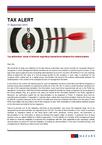Tax Alert, 17 September 2014
We would like to draw your attention to the fact that tax authorities have shown recently an increased interest in companies in which Management Board members do not receive remuneration for performing this function. In the light of the recent judgment of the Voivodship Administrative Court of 24 July 2014 (III SA/Wa 27/14) a tax authority willing to determine the value of a free-of-charge benefit for the company in such case, in particular for the company which makes part of a capital group, should take into account the existing relationships between the related parties in the context of the analysed services of management character.
In the event of tax control, the starting point for such consideration would be information provided by taxpayers in transfer pricing documentation as required by article 9a of the CIT Act. In order to avoid sanctions resulting from the lack of the required documentation, the information must meet formal requirements set out in the Polish tax regulations. It should be noted that the documentation prepared centrally by foreign companies for the purposes of the Group (Master File), as a general rule, does not include all the information defined in the Polish regulations. Moreover, tax authorities expect the tax documentation to be prepared in Polish. A relatively short time for submitting documentation if requested (7 calendar days) makes that using documentation held by the Group may be difficult in practice (because of the need to translate and verify the contained information from the point of view of the local entity) and may entail a risk for the company in case “only” translation is made without detailed analysis of the information provided to the tax inspectors.
Failure to provide one of the obligatory elements of documentation may cause the prepared study not to be recognized as tax documentation as required by the CIT Act. The lack of documentation in turn result in sanctions imposed on taxpayers based on the fiscal penal code which penalizes, among others: non-submission of documentation or tax information or failure to disclose the subject matter of taxation. A particular form of fiscal sanction is the so-called “liability for a fault in supervision”. It is the liability of a member of the management board for failure to meet the obligation to supervise the compliance with the rules applicable to the company’s activity (among others, by failure to meet the obligation of holding tax documentation in the area of transfer pricing), and consequently for allowing an offence to be committed.
Considering the fact that the Ministry of Finance appointed this year a special team dedicated to controlling related entities, which will cooperate with designated coordinators in all the fiscal chambers, fiscal control offices and tax offices for large taxpayers, more frequent and more efficient controls in the area of transfer pricing are to be expected.
Therefore, we would like to remind you about a recent change in the tax authorities’ position concerning the documentation of cash pooling agreements. A previous assessment of these transactions by tax authorities and administrative courts was unclear, in particular because of involvement of the bank – an independent entity – in this kind of structure. The currently prevailing position is that the actual aim of this system is to make funds available (in the form of actual or virtual transfers) between the Group entities and to derive benefits by these companies in the form of interest, i.e. it is a kind of loan, therefore the principles of cash pooling system and related transfers of funds should be subject to transfer pricing regime and documentation obligations, as is the case with granting guarantees by the entities from the same capital group.
From January 2015 changes regarding transfer pricing documentation, particularly important for partnerships (including hybrid businesses) will become effective. In line with the changes, in case of a deed of a company not being a legal person, joint venture deed or similar deeds entered into by related entities, the parties are obliged to prepare transfer pricing documentation which will include in particular a description of rules regarding the shareholders’ (parties’) rights to share in the profits and losses set out in the deed. In other words, shareholders will have to explain why they agreed on a particular distribution of profits, in particular if the profit-sharing ratio does not correspond to the proportion of contributions.
The draft amendments also provide for taxation of income of a Controlled Foreign Corporation (CFC).
Taking into account the above information we would like to encourage you to thoroughly analyse the situation of companies that you manage in order to protect yourselves against possible negative tax consequences and to adjust the structure or the activity of the companies to the changing legal framework and approach of tax authorities.
Should you need assistance in this matter, please do not hesitate to contact us.

